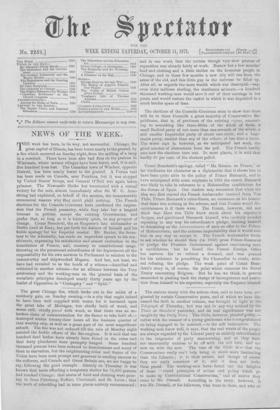Count Benedetti's apology, called 44 Ma Mission en Prusse," so
far vindicates his character as a diplomatist that it shows him to have been quite alive to the policy of Prince Bismarck, and to have anticipated with some emphasis iu 1869 the course Bismarck was likely to take in reference to a Hoheozollen candidature for the throne of Spain. Our readers may remember that when the idea was first started the French Ambassador received from Von Thule, Prince Bismarck's subordinate, an assurance on his honour that there was nothing in the scheme, and that Prussia would dis- countenance it if there were. The Count, however, did not think that Herr von Mile knew much about his superior's designs, and questioned Bismarck himself, who carefully avoided repeating in any way his subordinate's pledge, limiting himself to descanting on the inconveniences of such an offer to the Prince of Hohenzollern, and the extreme improbability that it would suit him in any way to accept it. The French Ambassador wrote to ask whether ho should then (in 1860) press Prince Bismarck to pledge the Prussian Government against sanctioning such a candidature, but he found the French Foreign Office too nervous for so critical a demand, and was praised for his reticence in permitting the Chancellor to evade, with- out refusing, the pledge. The weak point of Count Bene- detti's story is, of course, the point which concerns the Secret Treaty concerning Belgium. But he has, we think, in general succeeded in pushing back the charge of incompetence and hesita- tion from himself to his superiors, especially the Emperor himself.


































